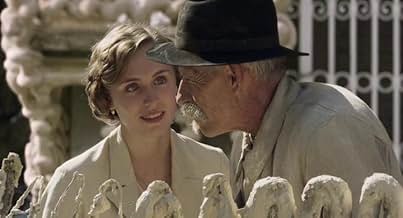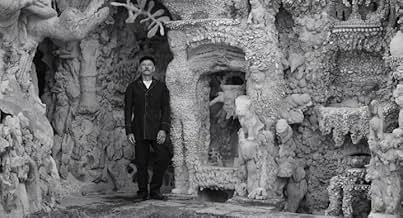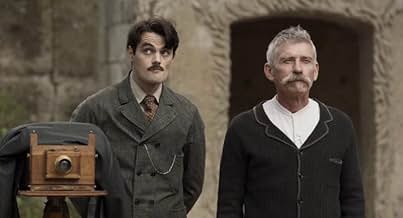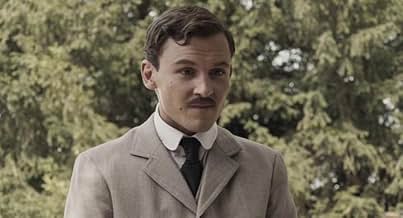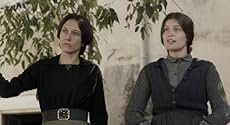PUNTUACIÓN EN IMDb
7,1/10
1,5 mil
TU PUNTUACIÓN
Cheval es un cartero que cada día recorre el departamento francés de Drôme, donde conoce a Filomena, la mujer de su vida, y tienen a Alice. Entonces empieza un proyecto loco: construir con s... Leer todoCheval es un cartero que cada día recorre el departamento francés de Drôme, donde conoce a Filomena, la mujer de su vida, y tienen a Alice. Entonces empieza un proyecto loco: construir con sus propias manos un palacio increíble.Cheval es un cartero que cada día recorre el departamento francés de Drôme, donde conoce a Filomena, la mujer de su vida, y tienen a Alice. Entonces empieza un proyecto loco: construir con sus propias manos un palacio increíble.
Argumento
¿Sabías que...?
- CuriosidadesAward: Best Actor Award to Jacques Gamblin at the Sarlat Film Festival.
- Banda sonoraAu Fil de l'eau
Composed and played on the accordion by Marc Perrone.
Reseña destacada
At the end of the 19th century, Joseph Ferdinand Cheval is a simple letter carrier who travelled the Drôme from village to village every day. Lonely, he is upset when he meets the woman of his life, Philomène. From their union is born Alice. For this child whom he loves more than anything else, Cheval throws himself into a crazy bet: to build for her with his own hands, an incredible palace. Never spared from life's trials, this ordinary man will not give up and will devote 33 years to build an extraordinary work: "The Ideal Palace".
Joseph-Ferdinand Cheval, a postman in the rural département of Drôme, was undoubtedly entitled to a biopic. Derided at first like Le Douanier Rousseau, Séraphine de Senlis, Antonio Ligabue and many others, he is now lauded for what he is really worth, a major figure of "naïve art", a "school" bringing together artists having no notion of being artists, and all the more admirable for that. Cheval was a devoted public agent, walking from one isolated farm to another, covering come rain or come shine, twenty miles a day. He went through particularly hard times (losing several loved ones, falling into depression) but nothing ultimately prevented him from completing the work of his life, his "Palais idéal", a huge monument made of pebbles and stones collected during his routes to which he added various other elements, the whole thing assembled together apparently at random, at any rate not abiding by the laws of architecture. Inspired by a photo of the Angkor Vat temple he once saw in a magazine, the amazing work of his life has survived the years and is visited yearly by hundreds of thousands of people. Nils Tavernier obviously admires Cheval and his unique creation and it shows. He also loves both the place and time his hero lived and worked. The viewer is thus treated to beautiful views of the rolling landscape around Hauterives, and at various times of the year, alternating with realistic rural interiors. Hence a feeling of total immersion in the Cheval's everyday environment. Kudos to production designer Jérémy Duchier, costume designer Thierry Delettre and cinematographer Vincent Gallot who helped Tavernier to capture the reality of the 1880-1920 period. Gallot's contribution is particularly noticeable in the magic final sequence where Cheval, at the very end of his life, dances with... his (then dead) daughter. The main asset of the film though is Jacques Gamblin, exceptional as le Facteur Cheval. Totally invested in his role, he manages to make the rather autisitic postman/artist decipherable and therefore touching and engaging. Often silent or inarticulate, stammering, with bird-like head movements, Gamblin renders to perfection Cheval's uncommon attitudes often mistaken by others for haughtiness or lack of empathy. Without many lines to say or climactic scenes to play, the actor nonetheless manages to impose his character, gradually making us close to someone seeming so aloof at first. Great art indeed. Likewise, Nils Tavernier avoids any spectacular and easy effects, which proves more and more winning as the story unfurls. Like a wide river, the film moves slowly, regularly but more and more powerfully, throwing you into something close to a state of meditation. You will not be captivated like by a thriller but if you play the game you won't lose out in the affair, instead you will gradually become part of a whole world to which you no longer have access today. Accompanied by a melodious music by Baptiste and Pierre Colleu, "L'Incroyable histoire du facteur Cheval" is much better than the lazy biopic certain reviewers, systematically allergic to the genre, have tried to reduce it.
Joseph-Ferdinand Cheval, a postman in the rural département of Drôme, was undoubtedly entitled to a biopic. Derided at first like Le Douanier Rousseau, Séraphine de Senlis, Antonio Ligabue and many others, he is now lauded for what he is really worth, a major figure of "naïve art", a "school" bringing together artists having no notion of being artists, and all the more admirable for that. Cheval was a devoted public agent, walking from one isolated farm to another, covering come rain or come shine, twenty miles a day. He went through particularly hard times (losing several loved ones, falling into depression) but nothing ultimately prevented him from completing the work of his life, his "Palais idéal", a huge monument made of pebbles and stones collected during his routes to which he added various other elements, the whole thing assembled together apparently at random, at any rate not abiding by the laws of architecture. Inspired by a photo of the Angkor Vat temple he once saw in a magazine, the amazing work of his life has survived the years and is visited yearly by hundreds of thousands of people. Nils Tavernier obviously admires Cheval and his unique creation and it shows. He also loves both the place and time his hero lived and worked. The viewer is thus treated to beautiful views of the rolling landscape around Hauterives, and at various times of the year, alternating with realistic rural interiors. Hence a feeling of total immersion in the Cheval's everyday environment. Kudos to production designer Jérémy Duchier, costume designer Thierry Delettre and cinematographer Vincent Gallot who helped Tavernier to capture the reality of the 1880-1920 period. Gallot's contribution is particularly noticeable in the magic final sequence where Cheval, at the very end of his life, dances with... his (then dead) daughter. The main asset of the film though is Jacques Gamblin, exceptional as le Facteur Cheval. Totally invested in his role, he manages to make the rather autisitic postman/artist decipherable and therefore touching and engaging. Often silent or inarticulate, stammering, with bird-like head movements, Gamblin renders to perfection Cheval's uncommon attitudes often mistaken by others for haughtiness or lack of empathy. Without many lines to say or climactic scenes to play, the actor nonetheless manages to impose his character, gradually making us close to someone seeming so aloof at first. Great art indeed. Likewise, Nils Tavernier avoids any spectacular and easy effects, which proves more and more winning as the story unfurls. Like a wide river, the film moves slowly, regularly but more and more powerfully, throwing you into something close to a state of meditation. You will not be captivated like by a thriller but if you play the game you won't lose out in the affair, instead you will gradually become part of a whole world to which you no longer have access today. Accompanied by a melodious music by Baptiste and Pierre Colleu, "L'Incroyable histoire du facteur Cheval" is much better than the lazy biopic certain reviewers, systematically allergic to the genre, have tried to reduce it.
- guy-bellinger
- 17 feb 2021
- Enlace permanente
Selecciones populares
Inicia sesión para calificar y añadir a tu lista para recibir recomendaciones personalizadas
- How long is The Ideal Palace?Con tecnología de Alexa
Detalles
- Fecha de lanzamiento
- Países de origen
- Sitios oficiales
- Idioma
- Títulos en diferentes países
- El palau ideal
- Localizaciones del rodaje
- Hauterives, Drôme, Francia(construction of the Ideal Palace, Cheval's tomb)
- Empresas productoras
- Ver más compañías en los créditos en IMDbPro
Taquilla
- Recaudación en todo el mundo
- 6.081.436 US$
- Duración1 hora 45 minutos
- Relación de aspecto
- 1.85 : 1
Contribuir a esta página
Sugerir un cambio o añadir el contenido que falta

Principal laguna de datos
By what name was El palacio ideal (2018) officially released in India in English?
Responde
![Ver Bande-annonce [OV]](https://m.media-amazon.com/images/M/MV5BYzgyNDgwOWUtMWI3ZC00ZjQyLTk3ZjYtOTFjODhjYjc2YWM5XkEyXkFqcGdeQXRodW1ibmFpbC1pbml0aWFsaXplcg@@._V1_QL75_UX500_CR0)
